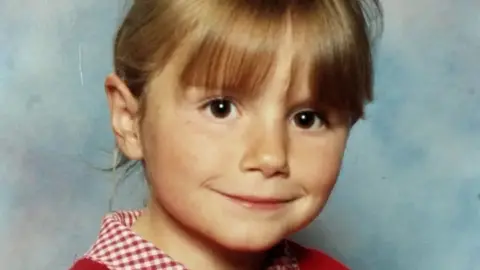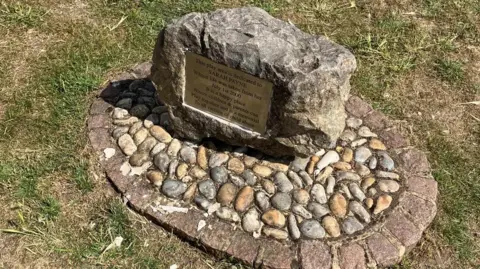Police reflect on Sarah Payne's murder 25 years on
 PA Media
PA MediaSarah Payne was just eight years old when she was abducted while playing near her grandparents home on 1 July 2000.
Her body was found 17 days later, several miles away in a field, just off the A29 near Pulborough in West Sussex.
Roy Whiting was jailed for life in December 2001 for her murder.
On the 25th anniversary of her disappearance, Martyn Underhill, the deputy senior investigating officer in charge of the murder investigation, has spoken of the legacy she left behind.

Martyn Underhill MBE served as a police officer in both the Metropolitan Police and Sussex Police from 1979 to 2009.
Mr Underhill, who now lives in Dorset, told the BBC it was one of the biggest investigations he was involved in.
There were 1,300 police officers involved and it cost nearly £3m.
He said: "The enormity of the task was the size of the search area which was hundreds of square miles.
"We had thousands of people helping, but it was a lengthy and laborious task trying to find Sarah's body."
He said the chances of finding Sarah was "diminishing rapidly" when there was no news of her whereabouts within three days of the search.
"It was almost a relief for the family and police when she was tragically found," he said.

Kevin Moore, now-retired, was head of Sussex Police CID during the investigation.
He said local detective inspector, Paul Williams identified "a number of individuals" at the time, including Whiting.
He said Whiting came on their radar because he could not account for his movements and had access to the van.
Later, crime scene investigation officers took the van "to pieces", he said, and found forensic evidence linking Sarah to the vehicle.
It was forensic science which helped solve the murder.
A strand of Sarah's hair was found on Whiting's sweatshirt and fibres from his clothes were found on the girl's shoe.
Patricia Wiltshire, a forensic ecologist from Surrey, was part of the investigation team.
She analysed pollen on some of Whiting's belongings and was able to place Whiting at the site where Sarah's body was found.
Other high profile cases Ms Wiltshire has helped investigate include the the murder of Milly Dowler in Walton-on-Thames and five women murdered by a serial killer in Ipswich in 2006.
Ms Wiltshire said she was "pleased" to bring Whiting to justice and "pleased science could be applied to help solve a crime".
Sarah's legacy
Following Whiting's conviction, Mr Underhill said a "source of pride" for him was helping launch Child Rescue Alert and for seeing Sarah's Law on the statute books.
Sarah's Law allows parents to ask police if someone with access to their son or daughter has been convicted or suspected of child abuse.
Sarah's mother, Sara Payne, had been advocating for such an initiative to be in place since her daughter's murder.
Sarah's Law followed a similar scheme, Megan's Law, in the United States.
Mr Underhill said: "The legacy of the tragedy of little Sarah is enormous.
"Millions of children in the UK have grown up in a safer environment.
"Not just because of Sarah's Law, but the whole process of managing high-risk paedophiles in the community which has changed so much since her murder.
"There's no doubt the case was tragic, but her legacy is enormous and her family must take some comfort from that."
 Elmbridge Borough Council
Elmbridge Borough CouncilSussex Police said Sarah's murder was "tragic and is still in the thoughts of many police officers and staff, past and present".
"Our thoughts remain with Sarah's family as we approach the 25th anniversary of her death."
Emily Konstantas, chief executive of The Safeguarding Alliance, said Sarah's Law was significant but there were limitations.
She said information cannot be passed on to others who may be responsible for safeguarding the child, which "hinders" taking a "collective and preventative approach to child protection".
"It is time to strengthen Sarah's Law to ensure that those best placed to protect children can share relevant information lawfully, responsibly, and without unnecessary barriers", she said.
"Protection must be proactive, not bound by red tape.
"We must also consider the urgent need for reforms such as Della's Law, which seeks to close the loophole allowing sex offenders to change their names and conceal their identities.
"Without addressing this, we risk rendering disclosure schemes ineffective.
"A joined-up approach is essential if we are to truly prioritise the safety of children."
A Home Office spokesperson said Sarah's Law had meant children were better protected from "vile sex offenders".
"This government will make it a statutory duty for chief police officers to follow published guidance and be consistent in their approach towards disclosures to prevent sexual harm," they said.
"This will help ensure children are as safe as possible against those with previous convictions for sexual offences."
Follow BBC Sussex on Facebook, on X, and on Instagram. Send your story ideas to [email protected] or WhatsApp us on 08081 002250.
